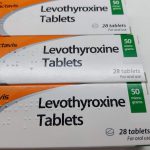Can You Take CBD Oil With Levothyroxine?

Drug interaction is defined as the changes in a drug’s effects due to recent or concurrent use of another drug or drugs (drug-drug interactions), ingestion of food (drug-nutrient interactions), or ingestion of dietary supplements (dietary supplement-drug interactions).
Drug-drug interactions result when two or more drugs react with each other. Such drugs can be from a combination of prescription drugs and/or over-the-counter (OTC) medications. Drugs with a narrow therapeutic range (little difference between therapeutic and lethal dose) are more likely to face incidents of serious drug interactions.
What is levothyroxine?
Levothyroxine is a prescription medicine used to treat an underactive thyroid gland (hypothyroidism). The thyroid gland makes thyroid hormones that help to control energy levels and growth. Levothyroxine is taken to replace the missing thyroid hormone thyroxine.
Levothyroxine belongs to a class of drugs called hormones. A class of drugs is a group of medications that work in a similar way. These drugs are often used to treat similar conditions. About 40-60% of orally administered levothyroxine is absorbed; the majority from the jejunum and upper ileum of the gastrointestinal tract. Absorption is increased when levothyroxine is taken on an empty stomach. Levothyroxine works by providing the thyroid hormone that your thyroid gland would produce if it were working normally.
About 1 to 2 weeks after you start treatment with levothyroxine, you will likely notice that your levels of fatigue have improved. It is important that you take your medication exactly as prescribed and not miss any doses as well as maintain routine checkups with your primary health care provider.
What is CBD oil?
Cannabidiol (CBD) oil is a product that’s derived from cannabis. It’s a type of cannabinoid, which are the chemicals naturally found in marijuana plants. Even though it comes from marijuana plants, CBD doesn’t create a “high” effect or any form of intoxication — that’s caused by another cannabinoid, known as THC. This quality makes CBD an appealing option for those who are looking for relief from pain and other symptoms without the mind-altering effects of cannabis or other side effects related to some pharmaceutical drugs.
CBD oil is made by extracting CBD from the cannabis plant and then diluting it with a carrier oil like coconut oil or hemp seed oil. CBD can be found in a variety of products online and in stores, including dietary supplements, bath soaks, drinks, and food.
It continues to gain momentum in the health and wellness world, with some scientific studies finding that it may ease symptoms of several conditions. A high-quality CBD oil may address a variety of thyroid dysfunctions. This underperformance includes hypothyroidism, hyperthyroidism, goiter, thyroiditis, and thyroid storm. All of the above conditions are triggered by chronic inflammation of the thyroid gland due to the body’s autoaggressive actions on this organ.
We know that endogenous cannabinoids (the ones produced by our bodies) help regulate our appetite, energy, homeostasis, and influence endocrine glands, including the pituitary gland and thyroid gland. Research does not yet know how external cannabinoids (like CBD oil) affect these glands and your serum thyroid hormones concentrations like TSH and T4.
A 2015 study found significant concentrations of CB1 and CB2 cannabinoid receptors in the thyroid glands. These receptors were associated with the shrinkage of thyroid tumors, showing promise as potential blockers of the spread of malignant cells on the gland.
Can you take CBD oil with levothyroxine?
No, you should never take CBD oil with levothyroxine together, because taking CBD oil with other medications that have similar effects like levothyroxine may increase the risk of unwanted symptoms or toxicity.
In addition, taking CBD oil while on levothyroxine treatment can lead to hyperthyroidism, a condition where your thyroid makes and releases high levels of thyroid hormone. This condition can speed up your metabolism. Symptoms of hyperthyroidism include a rapid heartbeat, weight loss, increased appetite, and anxiety.
Researchers are working to determine the specific interactions between CBD and various medications. Studies have been done on animals for certain medications, but in many cases, scientists are still determining how those results translate to humans.





